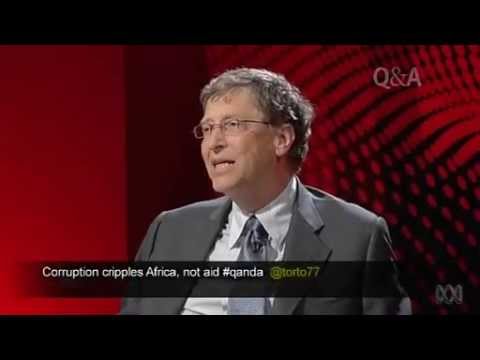In recent weeks, Bill Gates has weighed in on Daron Acemoglu and James Robinson’s Why Nations Fail (negatively) and Morton Jerven’s Poor Numbers (positively).
Admittedly, I’m a little late to this one, but the world’s richest book critic also took aim recently at development critic Dambisa Moyo, author of the controversial 2009 book, Dead Aid. The Sydney Morning Herald reported on the comments Gates made at a televised forum in Australia last week:
Mr Gates said the book had not helped in his aim for governments to increase their foreign aid spend. He added that the author “didn’t know much about aid and what aid was doing”.
“I think that that book actually did damage generosity of rich world countries,” Mr Gates said. “People have excused various [foreign aid] cutbacks because of it,” he added.
Mr Gates said if one was to objectively look at what foreign aid had been able to achieve then they “would never accuse it of creating a dependency”.
“Having children not die is not creating a dependency, having children not be so sick they can’t go to school, not having enough nutrition so their brains don’t develop. That is not a dependency. That’s an evil thing and books like that – they’re promoting evil,” he said.
The economist responded in a blog post on her website:
- I wrote Dead Aid to contribute to a useful debate on why, over many decades, multi billions of dollars of aid has consistently failed to deliver sustainable economic growth and meaningfully reduce poverty. I also sought to explicitly explain how decades of government to government aid actually undermined economic growth and contributed to worsening living conditions across Africa. More than this, I clearly detailed better ways for African leaders, and governments across the world, to finance economic development. I have been under the impression that Mr. Gates and I want the same thing – for the livelihood of Africans to be meaningfully improved in a sustainable way. Thus, I have always thought there is significant scope for a mature debate about the efficacy and limitations of aid. To say that my book “promotes evil” or to allude to my corrupt value system is both inappropriate and disrespectful.
- Mr. Gates’ claim that I “didn’t know much about aid and what it was doing” is also unfortunate. I have dedicated many years to economic study up to the PhD level, to analyze and understand the inherent weaknesses of aid, and why aid policies have consistently failed to deliver on economic growth and poverty alleviation. To this, I add my experience working as a consultant at the World Bank, and being born and raised in Zambia, one of the poorest aid-recipients in the world. This first-hand knowledge and experience has highlighted for me the legacy of failures of aid, and provided me with a unique understanding of not only the failures of the aid system but also of the tools for what could bring African economic success.
It’s a little surprising to me how much controversy Dead Aid continues to generate four years after its publication. The author recently got the full Jacob Weisberg interview treatment over atSlate, during which she — perhaps not coincidentally — had some suggestions for how Gates might better spend his money: endowing a university or building a Microsoft plant rather than funding humanitarian programs.
As Tom Murphy notes, Moyo doesn’t have an awful lot of fans among fellow economists, even those who share some of her doubts about the effectiveness of aid programs. Edward Carrsuggests that Moyo’s prominence has actually made it easier for people like Gates to dismiss the objections of slightly less extreme critics.



Leave a Reply